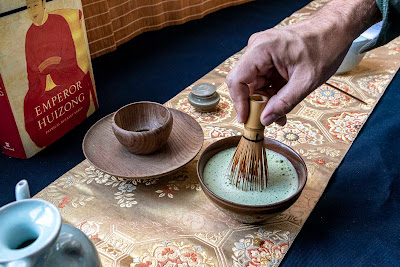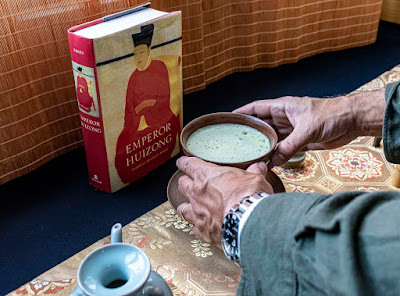In this article, we'll focus on tea's importance in the political, economical and even military aspects of life under Song Huizong. And since we're looking at the bigger picture, the reason why Huizong's life is fascinating is the fact that he's the emperor who lost half his empire to the nomadic Jurchen, his freedom and ultimately his life. Born in 1082, as the third son of emperor Shenzong, he wasn't supposed to become emperor and had already moved out of the palace. He's old brother, emperor Zhezong suddenly died at 23 without an heir and the second brother was passed over, because he was blind. The great question about Huizong is why and how he could loose so badly? What are the mistakes that he made that led to the catastrophe of loosing the northern half of the country and having to retreat to the south? Historians have blamed the fact that Huizong was were artistic minded, an accomplised poet, painter and calligrapher with a taste for luxury (large parks, new temples...). For some, everything he did led to the defeat. This book, however, tries to look at Huizong with a fair and balanced approach. For the author, his artistic accomplishments and extravagant spending didn't help against his foes, but every powerful ruler has his quirks and loves luxury (she mentions Louis XIV and Versailles). So, let's try to understand the situation by focusing on tea in this book.
1. Page 91
"The revenues set aside for the Privy Purse included the commodities that prefectures sent to the emperor, both as standardized gifts and because they were needed for palace use; items received as tribute from foreign countries; profits from government monopolies in salt, wine, and tea..."
Comment: The tax revenues would flow either to the Treasury to fund the Song State, or to the Privy Purse to fund the palace. So, under Huizong, there was a monopoly on tea and its proceeds went to the Privy Purse. This means that a buyer of tea had to go through the state monopoly to purchase tea and pay a tax. This was again the case under the communist rule, from 1949 to 2000 with the China National Native Produce (CNNP) monopoly.
2. Page 92."He (Zheng Bu) told Huizong that the Tea-Horse Agency annually brought in two million strings of cash."
3. Page 103
"A few months later, Cai Jing revived the long-defunct monopoly on southeastern tea, which soon was bringing in about 2.5 million strings of cash a year and made possible the acquisition of fifteen to twenty thousand horses annually."
Comment: Horses were plenty in the northern plains controlled by the Western Xia, the Jurchen and Liao, but a scarce resource in China. The Song military needed horses to strengthen its army, but you can imagine that its adversaries were not very keen selling a powerful weapon to the Song. That's why the Tea-Horse Agency could help: the inhabitants of what is now Tibet (then western Xia) loved tea that only grew in China and were therefore willing to sell horses for tea. This is why tea had even a strategic importance for the Song military!
"(...) during an audience with one of his former tutors, Xu Ji, Huizong said that Xu Ji had spent a lot of time outside the capital, he should tell him about the problems of the poor. Xu Ji in response talked about problems with the way the tea and salt monopolies were administered."
Comment: The issue of the poor and the tea and salt monopolies were linked, because we saw that the tea monopoly was contributing money to the Privy Purse, and the help to the poor were funded by the palace and not the State Treasury. The social welfare programs that Huizong started also explain why he was popular with many citizens.
"The government took other measures to ease the shortage of copper as well: it opened new mines, reduced the proportion of copper in the coins, permitted taxes to be paid in silver, issued iron coins for use in the northern border area and Sichuan, outlawed melting down coins, circulated vouchers in connection with the grain trade and the tea and salt monopolies that along with ordination certificates could be traded, and in time issued paper money."
Comment: Song dynasty was also a pioneer in using paper as money and in creating inflation. This was a consequence of the New Policies that were started by Wang Anshi in 1069 and continued under Huizong.
"Zhan objected that Cai Jing should not be put in the same class as Wang Anshi, who had stayed away from the tea and salt monopolies."
Comment: This means that, at first, when Wang Anshi started to implement his New Policies, there was no tea and salt monopoly. This was created or revived by Cai Jing (see page 103). Cai Jing was the grand councilor of the Council of State during most of Huizong's reign. This position is similar to that of prime minister. Emperor Huizong would allow other councilors or public servants to voice criticism of policies of other councilors, but this was risky and could cause your departure to a distant county. But when problems arose, like inflation, there was a lot of criticism that reached the emperor. Here, Zhan is criticizing Cai Jing for not keeping the same policies as Wang Anshi in place.
"The three-way negotiations ended with the Song increasing its subsidy to the Liao and providing one to the Xi Xia as well. Each year, Xi Xia was to get 130,000 bolts of silk, 50,000 ounces of silver, and 20,000 catties of tea."
Comment: This is the arrangement that was agreed during the Renzong (1022-1063) reign. Song China was paying its neighbors to have peace in the north. I find it interesting that they would send tea to all these foes, because it indicates that they were not that different culturally if they also enjoyed tea! While this payment was felt like a humiliation for the Song, it was just about 3% of the total tax revenue, much less than what the war would cost. Besides, most of the silver would flow back to China thanks to trade.
"Shenzong and Wang Anshi made progress on the critical issue of good horses. From 1074 on, the Tea-Horse Agency each year acquired ten thousand horses from Tibet in exchange for tea grown in nearby Sichuan."
Comment: Most of the time, trade means peace, but the purpose of the Tea-Horse Agency was to launch a war on Xi Xia in 1081, after having accumulated sufficient horses. It's also kind of paradoxical that the most peaceful product, tea, would be used to strengthen the army and lead to war!
"In the first month of 1125 Huizong sent a mission to congratulate the new Jin emperor Taizong on his accession. (...) Gifts ranged from tea and fruit to three horses fitted out with saddles decorated with gold and silver and bridles and whips adorned with ivory and tortoise shell."
Comment: Jin is the name of the Jurchen dynasty. Huizong would ally himself with the Jin against the Liao, probably his worst decision. Jin and Song were supposed to attack Liao at the same time, but Huizong's army had first to quell a tax revolt in the south (the Fang La uprising caused by inflation). And when the Jin were able to defeat Liao and saw how weak Song was, the Jin army entered Song territory and went straight to the capital Kaifeng. There, Huizong abdicated for his son, left the city, came back and they were taken prisoners by the Jin after the fall of the city in 1127. He died in captivity in 1135.
I hope you've enjoyed this more detailed review of tea during Huizong's reign from a policy point of view. The comments are my own and there's still no definitive answer to why Song was defeated and what he could have been done to avoid this loss. But historians and leaders better ponder how the richest and most technological empire of its time could loose to northern nomadic tribes. The parallels with present times (like inflation) are very interesting...
In the next part of my review, I'll go back to the lighter and enjoyable side of tea: its preparation and enjoyment! And if you want to brew tea in style, check out my latest Chabu!









No comments:
Post a Comment